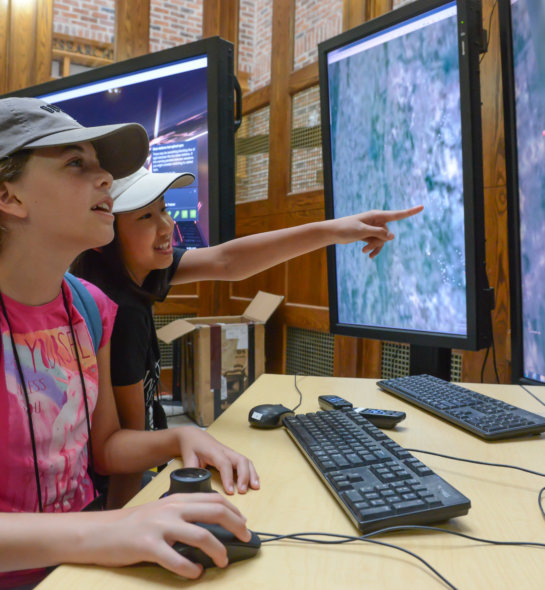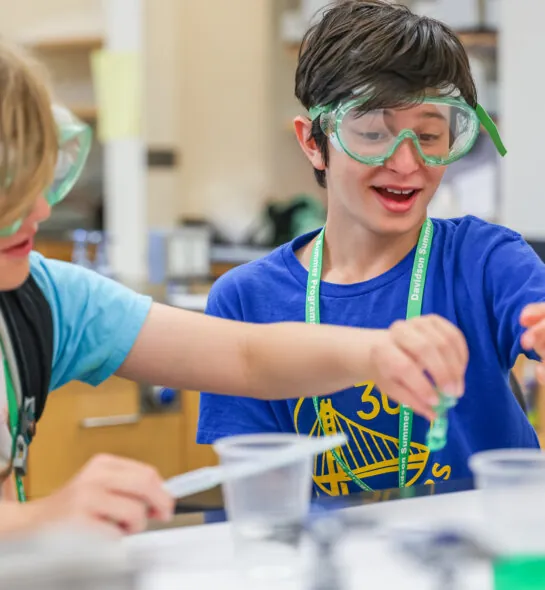Academics
2026 Academics
Davison Summer Programs has two academic models, designed to best fit the needs of Young Scholars ages 8-11 and ages 11-13. Learn more about the academic models and 2026 courses below!

Academic Workshops
Explorers Sessions
Designed for Young Scholars ages 8-11, academic exploration allows participants to engage in three unique workshops throughout their summer session. Participants will rotate through all three workshops (one per day), each taught by Davidson instructors who specialize in teaching profoundly gifted students.

Academic Seminars
Discoverers Sessions
Designed for Young Scholars ages 11-13, academic seminars allow participants to select one of three academic areas of focus, which involves three-and-a-half days of instruction and hands-on learning. Participants create an end-of-session project from their seminar coursework.
These project-based academic seminars are taught by Davidson instructors. Participants will be provided a short evaluation of their work, which may include accomplishments and areas of growth.
Davidson Summer Programs Academics
Session One
Superhero Lab
Calling all creative thinkers and story inventors! In this action-packed workshop, we’ll dive into the world of superheroes to uncover what makes them extraordinary and memorable. Through reading, discussion, and hands-on activities, participants will explore how heroes are built from imagination and insight. Then, they’ll mastermind original superheroes complete with fresh origin stories, cool powers, and exciting adventures.
The Physics of Light
In this workshop, participants will learn about the fascinating properties of light through engaging activities and eye-opening demonstrations. We’ll explore the optics of lenses and mirrors, see refraction and diffraction in action, and discover how images form in cameras and in the human eye. Along the way, we'll also investigate the wave and particle natures of light!
Digging up the Past and Discovering the Future
Are you interested in divining the future by learning about the past? The history of Ancient China holds many fascinating historical discoveries but none more mysterious than Oracle Bones. Participants in this workshop will use excavation, linguistic deciphering, and analysis to learn about how the future was divined for the influential figures of Ancient China. They will also get the opportunity to show what they have learned by creating their own oracle bone to divine their future.
Meet the Session One Instructors HERE!
Session Two
Superhero Lab
Calling all creative thinkers and story inventors! In this action-packed workshop, we’ll dive into the world of superheroes to uncover what makes them extraordinary and memorable. Through reading, discussion, and hands-on activities, participants will explore how heroes are built from imagination and insight. Then, they’ll mastermind original superheroes complete with fresh origin stories, cool powers, and exciting adventures.
The Physics of Light
In this workshop, participants will learn about the fascinating properties of light through engaging activities and eye-opening demonstrations. We’ll explore the optics of lenses and mirrors, see refraction and diffraction in action, and discover how images form in cameras and in the human eye. Along the way, we'll also investigate the wave and particle natures of light!
Digging up the Past and Discovering the Future
Are you interested in divining the future by learning about the past? The history of Ancient China holds many fascinating historical discoveries but none more mysterious than Oracle Bones. Participants in this workshop will use excavation, linguistic deciphering, and analysis to learn about how the future was divined for the influential figures of Ancient China. They will also get the opportunity to show what they have learned by creating their own oracle bone to divine their future.
Meet the Session Two Instructors HERE!
Session Three
Writing Nature: Craft and Practice in the Genre
If you’ve ever looked at a sunset or a rainbow or a snow-capped mountain and thought, “wow, I wish I could put that into words,” then Writing Nature is the seminar for you! This summer you will learn all about how to write eloquent, vivid descriptions of the natural world – a discipline known as nature writing. The class will discuss excerpts from classic works of nature writing, from John Muir and Mary Austin to Terry Tempest Williams and Edward Abbey. From these and other excerpts, we will develop a Craft Book, a set of concrete tools to transform students’ own nature writing. We will spend time in natural spaces on the UNR campus, observing, recording, and reflecting on what we see and hear and smell and feel and (sometimes) taste. And then we’ll put it all together: the final project asks students to produce, then read their own nature writing based on those field observations. Students’ work on this final project will develop skills of focus and specificity in thinking, expression, and delivery; it will also help students conceptualize their own critical and imaginative work as existing in context with others’ work.
Discovering Sound Through JavaScript
In this hands on summer coding course, students will explore the theme of discovery by building their own browser-based music synthesizer in JavaScript! Throughout the week, we'll examine the fundamentals of computer science such as working with variables, conditionals, loops, functions and getting objects on the screen. Students will dive into how computer-generated sound works, experimenting with waveforms, effects, and learn how to use Audio Context API to transform code into creative expression. We'll begin with a simple drum machine and gradually expand the project by adding instruments, adjusting pitch, controlling tempo, and more. From generating tones to crafting interactive controls, students will discover the power of programming while designing a digital instrument they can proudly share and play.
Engineering the Past: Unlocking the Mysteries of Ancient Egypt
This seminar will explore the mysteries and wonders of Ancient Egypt. How did archaeologists and linguists discover tombs and decipher hieroglyphics? How were the pyramids engineered with remarkable mathematical precision, and what are the origins and purpose of the Sphinx? To investigate these questions, students will draw on a range of STEM and humanities disciplines such as anthropology, engineering, linguistics, astronomy, sociology and mathematics to understand how Ancient Egyptians built complex structures, developed writing systems, and shaped early civilization. Students will excavate, analyze, and decipher artifacts and hieroglyphics, and experiment with engineering and physics principles as they recreate aspects of Egyptian pyramid construction. In small groups, they will also get the opportunity to research an Ancient Egyptian mystery of their choosing that is connected to innovations in science, mathematics, or engineering while using primary and secondary sources to create a brief presentation. Historians are not born but are shaped by curiosity, rigor, and creativity. Many mysteries about human history are still buried and this seminar offers students a simple step towards uncovering the mysteries of our shared past through both scientific inquiry and historical exploration!
Meet the Session Three Instructors HERE!
Session Four
Writing Nature: Craft and Practice in the Genre
If you’ve ever looked at a sunset or a rainbow or a snow-capped mountain and thought, “wow, I wish I could put that into words,” then Writing Nature is the seminar for you! This summer you will learn all about how to write eloquent, vivid descriptions of the natural world – a discipline known as nature writing. The class will discuss excerpts from classic works of nature writing, from John Muir and Mary Austin to Terry Tempest Williams and Edward Abbey. From these and other excerpts, we will develop a Craft Book, a set of concrete tools to transform students’ own nature writing. We will spend time in natural spaces on the UNR campus, observing, recording, and reflecting on what we see and hear and smell and feel and (sometimes) taste. And then we’ll put it all together: the final project asks students to produce, then read their own nature writing based on those field observations. Students’ work on this final project will develop skills of focus and specificity in thinking, expression, and delivery; it will also help students conceptualize their own critical and imaginative work as existing in context with others’ work.
Discovering Sound Through JavaScript
In this hands on summer coding course, students will explore the theme of discovery by building their own browser-based music synthesizer in JavaScript! Throughout the week, we'll examine the fundamentals of computer science such as working with variables, conditionals, loops, functions and getting objects on the screen. Students will dive into how computer-generated sound works, experimenting with waveforms, effects, and learn how to use Audio Context API to transform code into creative expression. We'll begin with a simple drum machine and gradually expand the project by adding instruments, adjusting pitch, controlling tempo, and more. From generating tones to crafting interactive controls, students will discover the power of programming while designing a digital instrument they can proudly share and play.
Engineering the Past: Unlocking the Mysteries of Ancient Egypt
This seminar will explore the mysteries and wonders of Ancient Egypt. How did archaeologists and linguists discover tombs and decipher hieroglyphics? How were the pyramids engineered with remarkable mathematical precision, and what are the origins and purpose of the Sphinx? To investigate these questions, students will draw on a range of STEM and humanities disciplines such as anthropology, engineering, linguistics, astronomy, sociology and mathematics to understand how Ancient Egyptians built complex structures, developed writing systems, and shaped early civilization. Students will excavate, analyze, and decipher artifacts and hieroglyphics, and experiment with engineering and physics principles as they recreate aspects of Egyptian pyramid construction. In small groups, they will also get the opportunity to research an Ancient Egyptian mystery of their choosing that is connected to innovations in science, mathematics, or engineering while using primary and secondary sources to create a brief presentation. Historians are not born but are shaped by curiosity, rigor, and creativity. Many mysteries about human history are still buried and this seminar offers students a simple step towards uncovering the mysteries of our shared past through both scientific inquiry and historical exploration!
Meet the Session Four Instructors HERE!